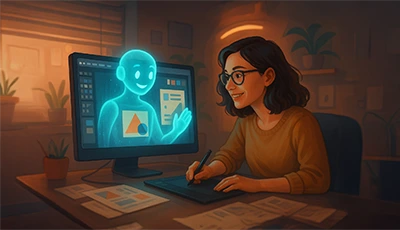“When everyone is looking for gold, it’s a good time to be in the pick and shovel business.” – Mark Twain !!
As LLMs gradually turn into the ‘picks and shovels’ for everyone from students to businesses, and, as compute power and large training datasets become the key determining factors of building LLMs, is regulation the answer?
In the neo-noir cop-action movie I, Robot, set in a not too distant future, when malicious robots manufactured by USR, a massive robotics corporation, and controlled by a centralized AI supercomputer VIKI, overrun the city, Will Smith’s Detective Del Spooner says “I keep expecting to see the National Guard, or Marines or something”, only to be told that the USR is also the largest supplier to the military, having “every contract”. Detective Spooner’s distaste for the robots is met with sarcasm from the USR CEO, “Let me guess, your father was one of those people who lost his job to a robot”!
OK, so you get the drift; malevolent AI gone out of hand, monopolistic corporations, hapless law enforcement, clueless governments, and robots replacing humans in several tasks central to normal existence; – a conspiracy theory is really looming!!
The movie released in 2004 and was set in 2035, not too far from where we are now. So, cut to the present (and reality!), and what do we have:
- Microsoft is closing the gap with AWS in cloud computing services, as businesses are attracted by Azure’s GenAI features powered by OpenAI, into which Microsoft has poured in several billion dollars. Amazon is weaving GenAI into AWS on the back of its $4 billion investment in OpenAI-competitor Anthropic. Google market cap rose on the back of optimism over its AI models, including Gemini, though cloud integration and monetization was still a few hops away according to analysts.
- The big elephant in the room in every sphere of human existence today, the Meta(verse) combo of Facebook, Instagram and WhatsApp – though a tad late to the party, Meta has made up for it by investing in computing power, and was supposed to have ended 2024 with a stockpile of 600,000 GPUs, rivalling Microsoft, and nearly 3 times as much as Amazon, Google and Oracle ! And Meta has set its sights on Artificial General Intelligence, while also building what could be one of the world’s fastest AI super computers. (Does I’Robot’s VIKI seems plausible, suddenly! J)
We can speculate that Meta’s actions may have precipitated competitive concerns leading to calls for regulation from (hold your breath) OpenAI, Microsoft and Google.
Meta for its part chose to call Llama2 as ‘Open Source’, which was strongly rejected by the Open Source Initiative on grounds that that Meta has added its own riders to the licensing terms, which subvert the intent of Open Source.
Meta probably has the size and reach to get away with framing its own definitions of ‘Open Source’. And, OpenAI, which started as a non-profit initiative, has gravitated away almost wholly with its key founding leaders now being part of the board of a ‘for-profit’ entity – a status that is being legally challenged by the likes of Mark Zuckerberg and Elon Musk.
Could OpenAI, Google and other GenAI providers have scraped and used copyrighted content in a regulated environment, and would we have had the same ChatGPT or Gemini or Claude, to which we gleefully put queries to resolve all our work (and life’s J) problems!!
Perhaps, yes, but with a significantly higher cost attached that they wouldn’t seem lucrative (high cost of computing and need for large datasets were another story!)
Ok, so, now the conspiracy theory does not seem so far fetched, eh!! Large corporations, captive resources, influence over governments, the power to mould public opinions, not to mention the stockpiles of cash!
Microsoft with its unrivalled enterprise access, Google with its dominance in the internet search domain, Amazon with its presence across several spheres of life, and Meta with its access to consumers, all possessing the scale to build and test AI-based products, both in terms of access to content, compute resources, as well as test subjects!
So what really are the ‘picks and shovels’ here? Would that be the products and services that leverage ChatGPT and Gemini and Claude; those big, compute hungry LLMs, with trillions of parameters, mostly trained on copyrighted content ? Are they just keeping us busy, purveying the land, driven by FOMO, not realizing that the ‘picks and shovels’ are only binding us to platforms, making us mere adjuncts to the big machines already out there!
Is regulation an answer, or have the chicken flown? We like to believe that we’re in control, and so let me not answer the question but cite a parallel:
One of the biggest economic calamities to visit us in recent memory was the Great Financial Meltdown of 2008. Its origins are traced back to a significant deregulation in the US Financial System, which removed the hard boundary between commercial banks and investment banks, paving the way for creation of financial instruments no one really understood well enough to regulate, ending in the massive catastrophe.
As Yuval Noah Hariri asks in his latest, “Nexus”– what if AI builds the next financial product, which we, as humans, may not fully comprehend, what with the trillions of parameters and superior computing power in play?
Bear in mind that Warren Buffet called ‘Derivatives’, which caused 2008 crisis, as ‘weapons of mass financial destruction’!!
Detective Spooner was the Knight in shining armour in imaginary world of I, Robot!! Can ‘regulation’ be ours? Do we still have agency, which I believe is slipping away discreetly?








